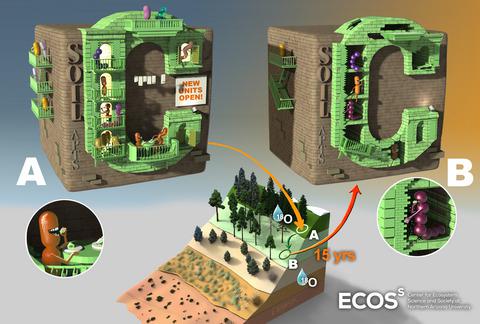当前位置:
X-MOL 学术
›
Glob. Change Biol.
›
论文详情
Our official English website, www.x-mol.net, welcomes your
feedback! (Note: you will need to create a separate account there.)
Decreased growth of wild soil microbes after 15 years of transplant-induced warming in a montane meadow
Global Change Biology ( IF 10.8 ) Pub Date : 2021-09-29 , DOI: 10.1111/gcb.15911 Alicia M Purcell 1 , Michaela Hayer 1 , Benjamin J Koch 1 , Rebecca L Mau 1 , Steven J Blazewicz 2 , Paul Dijkstra 1 , Michelle C Mack 1 , Jane C Marks 1 , Ember M Morrissey 3 , Jennifer Pett-Ridge 2, 4 , Rachel L Rubin 5 , Egbert Schwartz 1 , Natasja C van Gestel 6 , Bruce A Hungate 1
Global Change Biology ( IF 10.8 ) Pub Date : 2021-09-29 , DOI: 10.1111/gcb.15911 Alicia M Purcell 1 , Michaela Hayer 1 , Benjamin J Koch 1 , Rebecca L Mau 1 , Steven J Blazewicz 2 , Paul Dijkstra 1 , Michelle C Mack 1 , Jane C Marks 1 , Ember M Morrissey 3 , Jennifer Pett-Ridge 2, 4 , Rachel L Rubin 5 , Egbert Schwartz 1 , Natasja C van Gestel 6 , Bruce A Hungate 1
Affiliation

|
The carbon stored in soil exceeds that of plant biomass and atmospheric carbon and its stability can impact global climate. Growth of decomposer microorganisms mediates both the accrual and loss of soil carbon. Growth is sensitive to temperature and given the vast biological diversity of soil microorganisms, the response of decomposer growth rates to warming may be strongly idiosyncratic, varying among taxa, making ecosystem predictions difficult. Here, we show that 15 years of warming by transplanting plant–soil mesocosms down in elevation, strongly reduced the growth rates of soil microorganisms, measured in the field using undisturbed soil. The magnitude of the response to warming varied among microbial taxa. However, the direction of the response—reduced growth—was universal and warming explained twofold more variation than did the sum of taxonomic identity and its interaction with warming. For this ecosystem, most of the growth responses to warming could be explained without taxon-specific information, suggesting that in some cases microbial responses measured in aggregate may be adequate for climate modeling. Long-term experimental warming also reduced soil carbon content, likely a consequence of a warming-induced increase in decomposition, as warming-induced changes in plant productivity were negligible. The loss of soil carbon and decreased microbial biomass with warming may explain the reduced growth of the microbial community, more than the direct effects of temperature on growth. These findings show that direct and indirect effects of long-term warming can reduce growth rates of soil microbes, which may have important feedbacks to global warming.
中文翻译:

在山地草甸移植引起的变暖 15 年后野生土壤微生物的生长减少
土壤中储存的碳超过了植物生物量和大气中的碳,其稳定性可以影响全球气候。分解微生物的生长介导土壤碳的增加和损失。生长对温度敏感,并且鉴于土壤微生物的广泛生物多样性,分解者生长速率对变暖的反应可能是强烈的异质性的,在分类群之间存在差异,使得生态系统预测变得困难。在这里,我们展示了通过在海拔高度上移栽植物-土壤中宇宙而导致的 15 年变暖,大大降低了土壤微生物的生长速率,在田间使用未受干扰的土壤进行测量。不同微生物类群对变暖的反应程度不同。然而,反应的方向——生长减少——是普遍的,变暖解释的变异是分类学同一性及其与变暖相互作用的总和的两倍。对于这个生态系统,大多数生长对变暖的反应可以在没有特定分类信息的情况下解释,这表明在某些情况下,总体测量的微生物反应可能足以用于气候建模。长期实验性变暖也降低了土壤碳含量,这可能是变暖引起的分解增加的结果,因为变暖引起的植物生产力变化可以忽略不计。随着气候变暖,土壤碳的损失和微生物生物量的减少可以解释微生物群落生长的减少,而不是温度对生长的直接影响。
更新日期:2021-12-03
中文翻译:

在山地草甸移植引起的变暖 15 年后野生土壤微生物的生长减少
土壤中储存的碳超过了植物生物量和大气中的碳,其稳定性可以影响全球气候。分解微生物的生长介导土壤碳的增加和损失。生长对温度敏感,并且鉴于土壤微生物的广泛生物多样性,分解者生长速率对变暖的反应可能是强烈的异质性的,在分类群之间存在差异,使得生态系统预测变得困难。在这里,我们展示了通过在海拔高度上移栽植物-土壤中宇宙而导致的 15 年变暖,大大降低了土壤微生物的生长速率,在田间使用未受干扰的土壤进行测量。不同微生物类群对变暖的反应程度不同。然而,反应的方向——生长减少——是普遍的,变暖解释的变异是分类学同一性及其与变暖相互作用的总和的两倍。对于这个生态系统,大多数生长对变暖的反应可以在没有特定分类信息的情况下解释,这表明在某些情况下,总体测量的微生物反应可能足以用于气候建模。长期实验性变暖也降低了土壤碳含量,这可能是变暖引起的分解增加的结果,因为变暖引起的植物生产力变化可以忽略不计。随着气候变暖,土壤碳的损失和微生物生物量的减少可以解释微生物群落生长的减少,而不是温度对生长的直接影响。











































 京公网安备 11010802027423号
京公网安备 11010802027423号